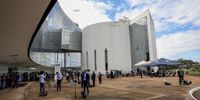The First Panel of the Supreme Federal Court (STF) is set to make a critical decision today regarding former President Jair Bolsonaro and seven others accused of involvement in a coup plot. The session, scheduled to commence at 9:30 AM, marks the second day of deliberations on a complaint filed by the Attorney General's Office (PGR) last month.
This high-stakes trial addresses allegations against eight of the 34 individuals implicated in a criminal organization aimed at undermining democracy between 2021 and early 2023. If the majority of the panel's five ministers vote to accept the PGR's complaint, Bolsonaro and his co-defendants will officially become defendants in a criminal case charged with serious offenses, including armed criminal organization, attempted violent abolition of the Democratic State of Law, coup d'état, qualified damage through violence and serious threat, and the deterioration of listed property.
Convictions for these charges could result in penalties exceeding 30 years in prison. The accused include Bolsonaro, along with notable figures such as Walter Braga Netto, General Augusto Heleno, Alexandre Ramagem, Anderson Torres, Almir Garnier, Paulo Sérgio Nogueira, and Mauro Cid.
According to the PGR's accusations, Bolsonaro was aware of a plan dubbed "Punhal Verde Amarelo," which outlined actions to assassinate key political figures, including President Luiz Inácio Lula da Silva and Vice President Geraldo Alckmin. Furthermore, the prosecution claims that Bolsonaro was cognizant of a draft decree intended to facilitate a coup, referred to as the "coup draft" during investigations.
On March 25, during the first day of the trial, Bolsonaro's defense team challenged the allegations presented by PGR head Paulo Gonet. Notably, Bolsonaro made a surprise appearance at the STF, a rare move for individuals under investigation. The ministers also dismissed several preliminary objections raised by the defense, including the annulment of Mauro Cid's plea bargain and the disqualification of certain ministers from the case.
As the trial progresses, the ministers will hear the relator's vote from Alexandre de Moraes, followed by contributions from Flávio Dino, Luiz Fux, Cármen Lúcia, and Cristiano Zanin. If the panel determines that the case should advance, the defendants will be subject to a full criminal trial where the prosecution will present evidence and witnesses, and the defense will have the opportunity to contest the charges.
During the first session, Moraes highlighted the coordinated and progressive actions of the alleged criminal organization, which he stated began in July 2021 and persisted until January 2023. He emphasized that the organization exhibited a consistent pattern of behavior aimed at dismantling the Democratic State of Law and toppling the legitimately elected government.
During Gonet's 30-minute presentation, he outlined Bolsonaro's role in promoting attacks on electronic voting machines and referred to the events following the second round of the 2022 elections, where protests calling for military intervention took place. Gonet also underscored the significance of the January 8 assault on the Three Powers' buildings in Brasília, linking it to the broader conspiracy.
In response, Bolsonaro's attorney, Celso Vilardi, argued that no incriminating evidence against the former president had been uncovered throughout the extensive investigation. The defense for former minister Braga Netto contended that the PGR failed to demonstrate individual culpability for the military figure.
As the ministers discussed the preliminary questions raised by the defense, they rejected arguments concerning the jurisdiction of the panel and the legality of the investigation process. Luiz Fux was the only minister to diverge, advocating for the case to be heard by the full Supreme Court instead of the First Panel.
In a significant turn of events, the First Panel unanimously voted to accept the PGR's complaint against Bolsonaro and his co-defendants, officially making them defendants in the case. This decision was reached during the third session of the trial, which began at 9:30 AM on March 26.
Minister Moraes initiated the merit vote, expressing his support for the complaint and underscoring the substantial evidence presented by the PGR against the accused. Flávio Dino quickly aligned with Moraes, emphasizing the historical implications of coup attempts, stating, "On April 1, 1964, no one died. But hundreds and thousands died afterward. A coup d'état kills."
Following Moraes and Dino's votes, Luiz Fux also supported the acceptance of the complaint, while signaling some disagreement regarding the events of January 8. Cármen Lúcia affirmed the materiality of the PGR's claims, noting that it would be premature not to accept the complaint.
As the session concluded, Zanin echoed the sentiments of Moraes and Lúcia, asserting that various documents and evidence substantiate the accusations against the defendants. With this unanimous decision, the path is now set for a criminal action against Bolsonaro and his allies, who may face significant legal consequences.
In a press conference following the ruling, Bolsonaro reiterated his belief that the accusations against him are unfounded and suggested that there is a personal vendetta against him. He argued that if he were guilty of any crime, he would not be present at the trial. He also commented on the ongoing discussions regarding an amnesty bill in Congress, framing it as a necessary step toward restoring normalcy in Brazil.
The trial has drawn considerable public attention, with many observing its implications for Brazil's political landscape. As the situation develops, the STF's decisions will undoubtedly have lasting effects on the country's democratic institutions and the accountability of its leaders.



